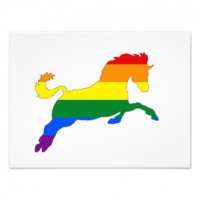Difference between revisions of "LGBTQ Presence in the Equestrian World"
| Line 50: | Line 50: | ||
* [[Robert Dover]] | * [[Robert Dover]] | ||
* [[Jim Graham (equestrian)]] | * [[Jim Graham (equestrian)]] | ||
| + | * [[Abigail Kwananakoa]] | ||
* [[George Morris]] | * [[George Morris]] | ||
* [[Mason Phelps Jr.]] | * [[Mason Phelps Jr.]] | ||
Revision as of 20:09, 29 December 2022
Equestrian refers to horseback riding and includes the skills of jumping (known as show jumping), eventing (being a race around and over various obstacles) and dressage (a form of riding with skilled synchronized movement between horse and rider). The sport has evolved to include competition in paralympic games.
The particular challenges in the sport include not only the ability to ride, but also the ability to bond with the horse and create a team effort, and have the lack of fear of speed and height when jumping. Equestrian requires maintenance, training, maneuvering, and over powering of a large animal which has an unpredictable mind of its own. There are tremendous risks in the sport, as represented by the profile of riders who have sustained injuries.
Equestrian events were first included in the Olympic games in 1900.
LGBTQ individuals have long had a successful presence in the equestrian world despite the fact it is considered a conservative sport, and most have reported being accepted within their community. Almost every one of the LGBTQ equestrians we have identified has been an Olympic games contender. Most have been successful in winning an Olympic medal. Many have also won world championships which are organized by the International Federation of Equestrian Sports (FEI). Many of the riders turn to training and coaching after their successful personal careers and have made a global reputation for their success, such as Britain's Carl Hester or American Robert Dover.
Unfortunately, there are no out lesbian or transgender individuals with a notable presence in the equestrian world to date. This is odd given the fact that the amateur equestrian world has far more female participants than male. The notion of riding horses as a symbol of masculinity is highly embedded in our contemporary culture, and this may impart a bias in the competitive world.
We have identified notable LGBTQ equestrians from Great Britain, The Netherlands, Canada, Spain, the United States, New Zealand and Germany. Simply click on their names to read their fascinating biographies.
Canada
Germany
Great Britain
New Zealand
Spain
The Netherlands
United States
- Darren Chiacchia
- Robert Costello
- Robert Dover
- Jim Graham (equestrian)
- Abigail Kwananakoa
- George Morris
- Mason Phelps Jr.
See Also
- LGBTQ Sports Management
- LGBTQ Sports Referees and Umpires
- LGBTQ Professional and Amateur Sports Coaches
- LGBTQ Tennis
- LGBTQ Cyclists
- LGBTQ Figure Skaters
- The Community of LGBTQ Boxers
- Professional LGBTQ Mixed Martial Artists
- Lesbian Football/Soccer Players
- The World of LGBTQ Golf
- World Sports Champions Who Identify as LGBTQ
- LGBTQ Athletes Who Have Won Olympic Gold
- LGBTQ Track & Field
- Lesbian Professional Basketball Players and Coaches

